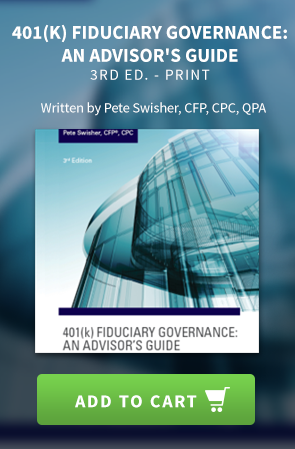IRS Issues
Considering the ongoing and future business impacts of the coronavirus, the American Retirement Association asked the Treasury and DOL for relief from certain retirement plan filing deadlines.
“The American Retirement Association is writing to request relief from certain provisions under the...
READ MORE
Tech Talk addresses where the RMD of a participant who has died should be sent.
READ MORE
There are few things more annoying in daily existence than those ubiquitous pop-up service agreement acknowledgements, writes Nevin Adams in MarketBeat. He discusses a recent Supreme Court decision in which the Court weighed in on a case involving participant disclosures.
READ MORE
The Setting Up Every Community for Retirement (SECURE Act) Act was enacted on Dec. 20, 2019 as part of the Further Consolidated Appropriations Act of 2019. Many of these provisions had been pending in Congress for some time, and the law brings about the biggest changes in retirement since the...
READ MORE
The IRS announced on March 11 that high-deductible health plans (HDHPs) can pay for 2019 Novel Coronavirus (COVID-19)-related testing and treatment without jeopardizing their qualified status. This also means that an individual with an HDHP that covers these costs may continue to contribute to a...
READ MORE
There may be a whole new focus emerging with regard to excessive fee litigation.
Last week a reader shared with us an “Excessive Fee Questionnaire Regarding Defined Contribution Plans.” This document was reportedly presented to a plan sponsor of a $170 million plan—from its property and...
READ MORE
Tech Talk addresses how to calculate an RMD for a deceased participant.
READ MORE
In MarketBeat, John Iekel discusses a blog post that answers the seemingly obvious question of whether RMDs have to be paid for a deceased participant.
READ MORE
The IRS has updated comprehensive resources designed to help anyone making IRA contributions or receiving IRA distributions for tax year 2019 or considering making retirement donations before April 15, 2020.
The publications, both of which address the unique features of Roth IRAs and traditional...
READ MORE
The IRS has clearly indicated that no qualifying event is required for transfers or exchanges.
Thus, pre-59½ withdrawal restrictions do NOT apply to the values that are being transferred or exchanged under the final regulations. There have been reports of vendors refusing to honor requests for...
READ MORE
How do your clients’ 403(b) plans fare in complying with the applicable requirements under the tax code? The IRS has updated its list of the top 10 considerations in gauging adherence to the rules.
In its 403(b) checklist, the IRS suggests that plan sponsors and administrators consider the...
READ MORE
The details of a shift in process review by the IRS first reported by the American Retirement Association were “the elephant in the room” at a Joint TE/GE Council Employee Plans & Exempt Organizations meeting on Feb. 28.
Following the usual outline of accomplishments for the past year, Tammy...
READ MORE
Tech Talk addresses whether RMDs still have to be paid when an employee who had been taking his RMDs after he attained age 70½ dies.
READ MORE
Even though an employer is permitted to delay contributions to a 403(b) account until the following year, there are several reasons why it may not be in the best interest of the employer to do so.
For example, matching contributions are usually made to entice employees to participate in the plan...
READ MORE
Two laws enacted in December—the Miners Act and the SECURE Act—will have wide-ranging effects on retirement plans. A recent American Society of Enrolled Actuaries (ASEA) webcast provided a closer look.
Both measures really are part of the Further Consolidated Appropriations Act, 2020. In “DB...
READ MORE
Driven by an apparent desire to clean up its case backlog, the IRS is planning a shift in procedure that might mean the end of the VCP program and subject a massive number of plans to audit.
Word of the dramatic shift in focus was brought to the attention of the American Retirement Association...
READ MORE
Tech Talk addresses whether administrative and legal expenses incurred concerning tax-exempt 457(b) plans (i.e., document costs) can be paid from plan assets.
READ MORE
The IRS has issued the draft instructions for the 2020 IRS Forms 1099-R and 5498: Distributions from Pensions, Annuities, Retirement or Profit-Sharing Plans, IRAs, Insurance Contracts, etc. But these instructions are only drafts, and are not to be used for actual filing.
The information to be...
READ MORE
For years after 2001, EGTRRA amended IRC §403(b)(3) to include a provision that permits employers to make contributions for employees who have terminated their employment with the employer. The amount of each year’s post-employment contribution is based on the employee’s includible compensation...
READ MORE
The American Retirement Association has outlined a number of high priority clarifications needed following passage of the SECURE Act.
In a letter dated Feb. 12, the ARA submitted to Carol Weiser, Benefits Tax Counsel at the U.S. Department of the Treasury, a list of “certain issues related to...
READ MORE


